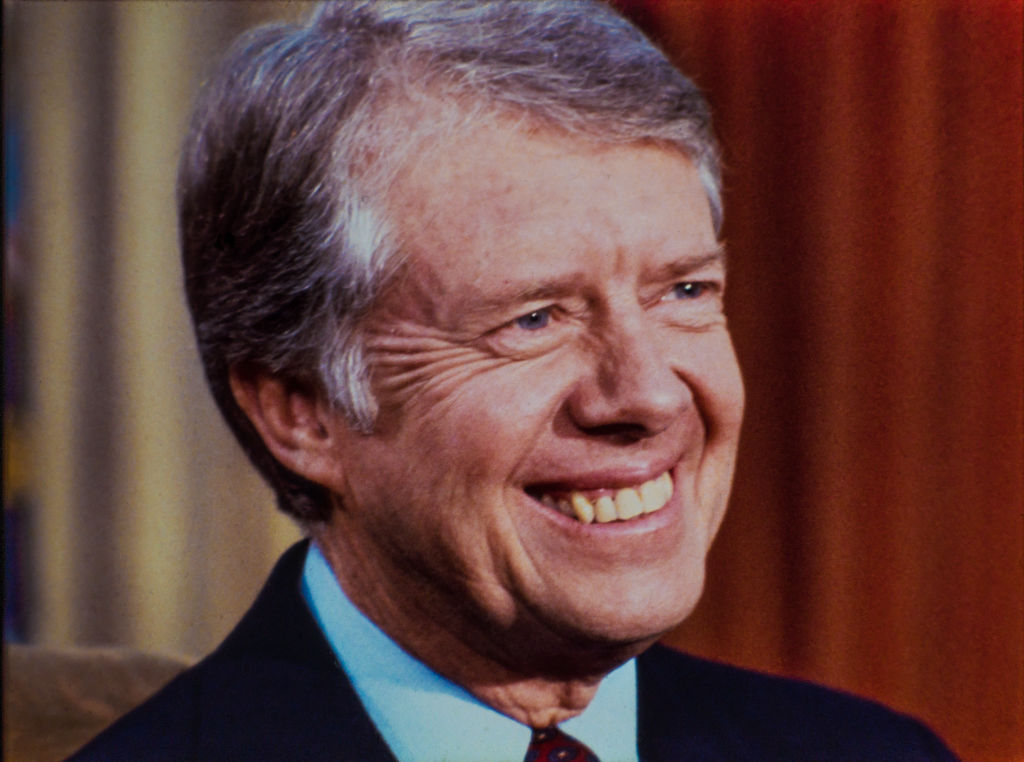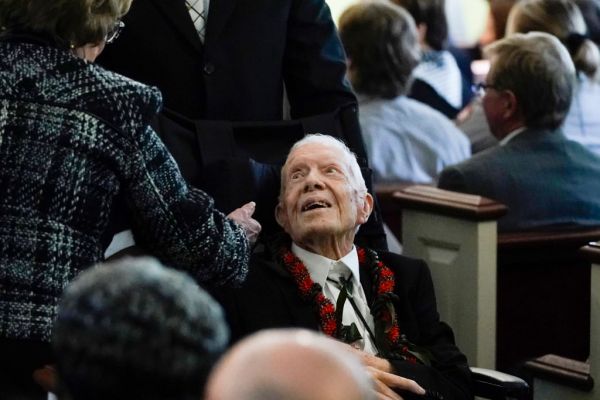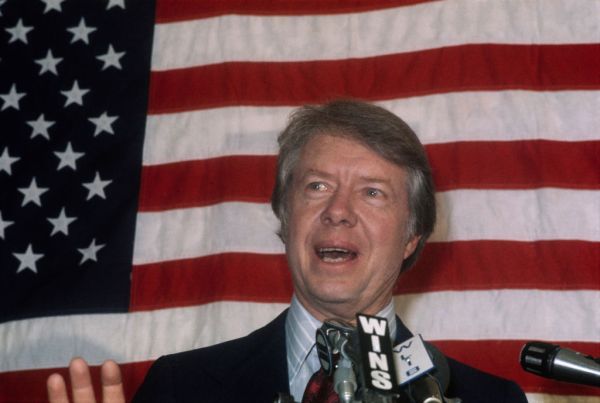Jimmy Carter, who is in hospice care, has many virtues. He was an honorable man who held the country together during the post-Watergate period when many Americans had lost confidence in their national institutions. He was fiscally conservative, a prudent environmentalist, and a populist in his own right. But the notion that human rights were the defining aspect of his foreign policy is simply wrong. Carter was sincere about his ideals, but the mandates of the Cold War caused him to shelve human rights concerns for the sake of power politics.
For most of his two-year run for the presidency, Carter rarely spoke about human rights. In an attempt to be all things to all people, he wanted to both support détente and criticize then-President Gerald Ford and Secretary of State Henry Kissinger for their amoral foreign policy. The American people were seeking a measure of idealism from their leaders in the aftermath of the Vietnam debacle and investigations into CIA abuses, and human rights advocacy was clever politics.
But even in the campaign, there were limits to how far Carter would go. In May 1976, Carter gave an expansive speech on human rights at Notre Dame University. But beforehand, he insisted that the section criticizing Iran be removed from the draft for it might “tie my hands” in dealing with the shah. In pursuit of votes from the Jewish American community, Carter did speak at times about Russian Jews who were prevented from leaving the Soviet Union. This was another one of his swipes at détente. Discussing human rights became a convenient tool for castigating Ford without abandoning arms control negotiations with the Soviet Union. In essence, Carter successfully ran to both Ford’s right and left.
As president in May 1977, Carter laid out his foreign policy vision in another speech at Notre Dame. It is mostly remembered for his catchphrase that “inordinate fear” of communism had caused America to be allied with unsavory right-wing dictatorships. On human rights, Carter intoned, “First, we have reaffirmed America’s commitment to human rights as a fundamental tenet of our foreign policy.” What is often neglected is his subsequent claim, “This does not mean that we can conduct our foreign policy by rigid moral maxims.”
Once in office, Carter appointed civil rights veteran Patricia Derian to lead the human rights bureau at the State Department, but it was Deputy Secretary of State Warren Christopher who was actually in charge of the file. Derian was a human rights absolutist—dogmatic, defiant, and utterly ineffective in government where compromise is the currency of exchange. Whereas Christopher, a laconic lawyer best known for his lack of imagination, made an art of occupying various high offices without doing much in those positions. In the Carter administration, Christopher helped to ensure that idealistic intentions did not impact the administration’s core concerns.
Take arms control, for example. Carter pledged to promote human rights in an exchange of letters with famed Soviet dissident Andrei Sakharov, but he didn’t want to risk a potential nuclear agreement with the Soviet Union by angering his Soviet interlocutors over human rights. As a former Navy nuclear engineer, he found all the details about the range of missiles and types of payloads irresistible. Plus, he and his advisers were ardent disciples of the idea that the Soviet Union was a normal regime, a potential arms control partner, and a responsible stakeholder in global affairs. Only when Reagan became president did human rights become an important issue in U.S-Soviet relation.
Among Carter’s greatest human rights blind spots was China. Richard Nixon may have forged the opening to China, but it was Carter who completed the process of normalization. Deng Xiaoping did reform China’s economy, but he also sustained the repressive apparatus he inherited from one of history’s greatest mass murderers, Mao Zedong. Successive American presidents wrongly believed that by playing the so-called China card they could extract concessions from the Soviet Union. There is no evidence that the Kremlin adjusted its nuclear policies because Washington resumed relations with Beijing.
The uncritical approach to China led Carter to look away from the most grievous human rights catastrophe of the 1970s, the Cambodian genocide. China nurtured the Khmer Rouge and enabled its rise to power in 1975. Seeking to create an agrarian Communist utopia, the Khmer Rouge emptied cities and killed approximately 1.7 million people over four years. As with Russia and a nuclear arms agreement, Carter did not let the unfolding genocide endanger the normalization of ties with Beijing.
That did not sit well with many in Congress who demanded the administration do something about the killing fields. Even the peacenik Sen. George McGovern called for assembling an international coalition to “knock this regime out of power.” Carter kept his distance, and Christopher claimed that America had “no leverage to affect the human rights situation in Cambodia.” Washington could have conditioned the normalization of ties with China on its cessation of support for the Khmer Rouge, but Carter’s State Department rejected such a step. “We believe … it would be a serious mistake to inject the Cambodian human rights violations into the future U.S.-PRC [People’s Republic of China] bilateral negotiations on normalization.” It was eventually Vietnam that put an end to the genocide by invading Cambodia in 1978, an act condemned by the Carter administration.
Carter’s critics have long claimed that he “lost Iran.” By pressing Shah Mohammad Reza Pahlavi to enact liberal reforms, America galvanized the opposition and then stood by as the monarchy was displaced by an Islamist regime that continues to haunt the Middle East. Human rights, however, played little role in Carter’s approach to Iran, as he was focused on arms sales, Persian Gulf security, and gaining the Shah’s support for his peacemaking between Israel and Egypt. It may come as a surprise to many that Carter implored the Shah to clamp down on the opposition and even contemplated a coup to thwart the revolution. Instead the Shah and his feckless generals gave up the fight and chose exile in the West rather than save their country.
Carter’s human rights activism was most visible in Latin America. The region was considered less important, geopolitically, and so it was an opportunity to express his idealism that came at a little cost. Latin America was then populated by many unsavory right-wing dictatorships such as those in Argentina and Chile. The administration did impose conditions on aid and issue reports on human rights abuses while its ambassadors pressed their host countries to improve their behavior. There was an actual cost to all this with the collapse of Anastasio Somoza and the assumption of power by leftist Sandinistas who continue to misrule Nicaragua to this day. Somoza relied on U.S. aid and support and its absence and his own misjudgments doomed his rule. Still, the prodding of right-wing dictatorships in places such as Argentina did save lives.
There are many reasons to commend Jimmy Carter. As a Southern moderate who abhorred racism, he pulled his region away from hate and bigotry. As a man of faith, he injected moral considerations into mainstream politics. While those attributes lend credence to the idea that he was a staunch advocate of human rights, he did not transcend the Cold War. He played the game by the rules that he found, which meant too often ignoring his own lofty ideals.








Please note that we at The Dispatch hold ourselves, our work, and our commenters to a higher standard than other places on the internet. We welcome comments that foster genuine debate or discussion—including comments critical of us or our work—but responses that include ad hominem attacks on fellow Dispatch members or are intended to stoke fear and anger may be moderated.